|
The Hellenic Genocide
Quotes from historical documents and related Photos. |
|||
CHAPTER XXII: "These leaders not only reverted to the barbaric conceptions of their ancestors, but they went to extremes that had never entered the minds of the early sultans. Their fifteenth and sixteenth century predecessors treated the subject peoples as dirt under their feet, yet they believed that they had a certain usefulness and did not disdain to make them their slaves. But this Committee of Union and Progress, led by Talaat and Enver, now decided to do away with them altogether. The old conquering Turks had made the Christians their servants, but their parvenu descendants bettered their instruction, for they determined to exterminate them wholesale and Turkify the empire by massacring the non-Moslem elements." CHAPTER XXII: "And now the Young Turks, who had adopted so many of Abdul Hamid's ideas, also made his Armenian policy their own. Their passion for Turkifying the nation seemed to demand logically the extermination of all Christians---Greeks, Syrians, and Armenians. Much as they admired the Mohammedan conquerors of the fifteenth and sixteenth centuries, they stupidly believed that these great warriors had made one fatal mistake, for they had had it in their power completely to obliterate the Christian populations and had neglected to do so." CHAPTER XXII: "Similarly, had they destroyed all the Rumanians, Serbians, and Greeks, the provinces which are now occupied by these races would still have remained integral parts of the Sultan's domain. They felt that the mistake had been a terrible one, but that something might be saved from the ruin. They would destroy all Greeks, Syrians, Armenians, and other Christians, move Moslem families into their homes and into their farms, and so make sure that these territories would not similarly be taken away from Turkey." CHAPTER XXII: "In 1898, when all the rest of Europe was ringing with Gladstone's denunciations and demanding intervention, Kaiser Wilhelm the Second had gone to Constantinople, visited Abdul Hamid., pinned his finest decorations on that bloody tyrant's breast, and kissed him on both cheeks. The same Kaiser who had done this in 1898 was still sitting on the throne in 1915, and was now Turkey's ally. Thus for the first time in two centuries the Turks, in 1915, had their Christian populations utterly at their mercy. The time had. 'finally come to make Turkey exclusively the country of the Turks." CHAPTER XXIII: "Though the air, all during the autumn and winter of 1914-15, was filled with premonitions of trouble, the Armenians behaved with remarkable self-restraint For years it had been the Turkish policy to provoke the Christian population into committing overt acts, and then seizing upon such misbehaviour as an excuse for massacres. The Armenian clergy and political leaders saw many evidences that the Turks were now up to their old tactics, and they therefore went among the people, cautioning them to keep quiet, to bear all insults and even outrages patiently, so as not to give the Moslems the opening which they were seeking. "Even though they burn a few of our villages," these leaders would say, "do not retaliate, for it is better that a few be destroyed than that the whole nation be massacred."" CHAPTER XXIII: "When we consider what had happened before and what happened subsequently, there remains little doubt concerning the purpose which underlay this demand. Djevdet, acting in obedience to orders from Constantinople, was preparing to wipe out the whole population, and his purpose in calling for 4,000 able-bodied men was merely to massacre them, so that the rest of the Armenians might have no defenders. The Armenians, parleying to gain time, offered to furnish five hundred soldiers and to pay exemption money for the rest; now, however, Djevdet began to talk aloud about "rebellion," and his determination to "crush" it at any cost. "If the rebels fire a single shot," he declared,"I shall kill every Christian man, woman, and" (pointing to his knee) "every child, up to here."" CHAPTER XXIV: "The Armenians are not the only subject people in Turkey which have suffered from this policy of making Turkey exclusively the country of the Turks. The story which I have told about the Armenians I could also tell with certain modifications about the Greeks and the Syrians. Indeed the Greeks were the first victims of this nationalizing idea." CHAPTER XXIV: "I have already described how, in the few months preceding the European War, the Ottoman Government began deporting its Greek subjects along the coast of Asia Minor. These outrages aroused little interest in Europe or the United States, yet in the space of three or four months more than 100,000 Greeks were taken from their age-long homes in the Mediterranean littoral and removed to the Greek Islands and the interior." The Hellenic Genocide Quotes from historical documents and related Photos. Previous page | Initial page | Site Map | Next page (9th of 29) |
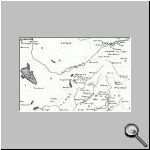
Angora to Sivas.
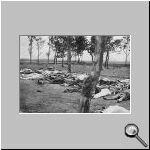
Extermination under the guise of deportation.
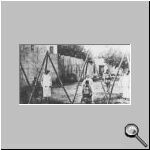
Christian leaders hanged.
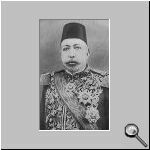
Mohammed V, late Sultan of Turkey.
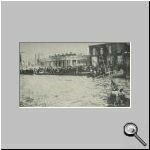
The despair to escape makes a boat sink.
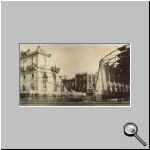
The House of the Hellenic Soldier. Burnt.
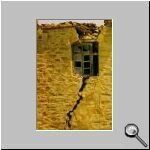
The window of a house in Imvros.
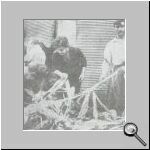
Hellenic property destroyed in Constantinople.
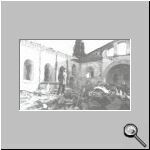
Destruction of the Church Agios Minas.
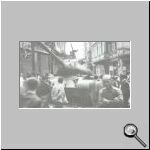
A Turkish tank at Tounel Square.